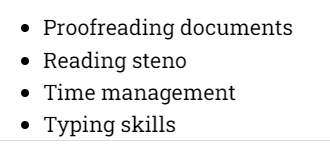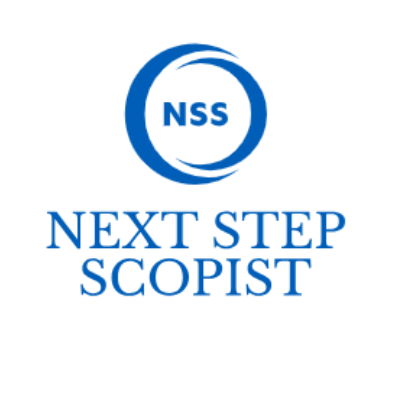April 27th, 2024 – How Can I Build And Improve My Skills In 2024? – An updated guide to improving your scopistry, transcription, or proofreading skills

Back in November of 2023, I posted How To Consistently Improve Your Scopistry Skills. I like this post and I’m proud of it. However, I have also learned a considerable amount about how to keep your skills up to date even in the almost six months since that blog went up. The information I posted there still very much applies, and I practice those tips myself, regularly. That being said, this industry is always changing, and there is always something new to do and learn.
We don’t gatekeep in this house, so today I want to share a bit of an updated version of that post. Today, I want to talk to you about how to improve your scopistry, proofreading, and/or transcription skills. I want to share what I’ve learned, and let you know more ways you can maintain your current skill set as well as acquire new and valuable skills to help you in your professional endeavors.

Things You SHOULD DO To Build And Improve Your Skillset
Identify The Skills You Need And Hone Them Individually
I am trained and work as a scopist, but it is not my only job; I also do proofreading and transcription. In switching back and forth between these jobs, I have noticed where the skills overlap, as well as where other skills are decidedly more important.
Depending on what you are doing, you should identify the different skills you need, and hone them individually. Think of yourself as a winning sports team. Each team is only as good as its weakest player. The weakest of your skills will determine your ability to perform your job efficiently. So, make sure they’re all equally as strong.
These skills include, but are not limited to:

Master The Specific Style You’re Working In
The jobs you do require a template for you to work from. Scopistry, proofreading, and transcription all follow a different set of rules and guidelines that you need to follow. One way to ensure you’re always producing your best work is to become a master at that template. Practice and memorize the specific rules so you can spot the mistakes from a mile away. Not all templates and styles are the same, and the guidelines you follow vary between industries and clients.
If you’re a proofreader, you need to be aware of the different style guides you’re working with. You need to understand academic versus journalistic style guides, or any regional standards. Find the style guides you need and make it a priority to learn it inside and out. Here is a great post on how to find some of the style guides you may need as a proofreader.
Similar to style guides, you need to be aware of the conventional grammar/spelling rules. This sounds mundane, but depending on your client, you may be looking at different spellings or uses of common punctuation. Consider the difference between American English and Canadian English. You’ll need to understand the spelling differences in words like color/colour, neighbour/neighbor, etc.

Learn The Common Mistakes
Whether you are a scopist, proofreader, or transcriptionist, the community is a wonderful place to find answers and learn from the experiences of others. There are many forums and groups on social media where people come together to share information.
Scopists can find steno that other scopists or court reporters see in their work, common misstrokes, variations in steno, etc. Proofreaders can find punctuation and grammar mistakes that occur, or find ways to punctuate uncommon sentences. Everyone can find information on blogs where professionals explain some of the main differences and mistakes they see.
Finding these communities on places like Facebook, Instagram, and Reddit can give you great insight into questions people regularly have, mistakes they see, or mistakes they’ve made!
Practice
This is a helpful tool for everyone, but especially so if you are new to the industry and trying to get paid for your work. There will always be a need to practice your skills and continue to get better, no matter how long you’ve worked in the industry. However, for newcomers, practice is how you can earn credibility, which is essential in gaining paid clientele.
Proofreaders can offer free or low-rate services for ESL learners as a way to practice. Proofread essays, emails, or messages to help them sound more articulate. You can gain insight into common mistakes that are made, as well as earning you some money. If you’re charging, of course.
Challenge yourself by reading and editing a variety of texts, as a way to keep yourself updated on the different guides and styles. Expose yourself to different genres and audiences as well, to get a feel for tones and intention.
Practice Is Important.
Especially if you’re new, you will want to find opportunities to hone your craft before offering your skills to other professionals. I have found, especially in scopistry, that “new” or “student” scopists are overlooked when court reporters are looking for someone to help them out.
When I got started, one of the tips I got was, “Keep an eye on the Facebook groups, that’s where the jobs are.” And this is true, you will find a lot of jobs there. However, the jobs go to people who have been active on the site for a long time, who have been posting in the group consistently, and who have previous reporters who vouch for them.
These are perfectly valid and reasonable, and I don’t fault anyone for whom they feel more comfortable working. However, as someone who was new to the industry, I did not have any of those things. So, in my own experience, I did not find the FB groups to be helpful when looking for work and ended up going in a different direction to find paid opportunities.
I’m not saying it can’t happen, or that you won’t get lucky on the FB groups. What I am saying, is that it didn’t happen for me. I wasted a lot of time messaging people who had posted looking for scopists just to get ghosted because I didn’t have the credibility yet that comes with years of working in the industry. But by practicing my skills, offering trials so reporters could see what I could do, and working hard every day to improve my skills, I was able to start securing jobs.

Things You SHOULD NOT DO To Build And Improve Your Skillset
Shy Away From Criticism
I remember the first rejection I ever received put me in bed for a long time just wallowing and feeling sorry for myself. I regret that behaviour for a myriad of reasons, not the least of which is that I had no reason to do that. The rejection I received was painful to hear, however, the person was incredibly respectful, kind even, and took the time to explain to me where I could improve to be a better candidate for the next client.
This person was more experienced than me and I was lucky, but I was also very discouraged so early in my career. It occurred to me later that being rejected at the very beginning of your journey (or anywhere in your journey) is not uncommon, and that I am not special for needing to work harder.
It took some soul searching, some ice cream, and a lot of positive encouragement from my husband to make me realize that I wasn’t doing myself any favours by ignoring the incredible advice I had been given and doing the work to make myself better.
Criticism is not inherently bad. No one is perfect and there is always something we can be better at or learn. It’s not personal, and your value does not diminish because there is something you can improve on.
Feedback from clients, peers, and third parties must be welcomed. You can understand different perspectives, get another set of eyes on your work, and see things you may have missed. This is an opportunity to grow, learn, and be better. The better you are, the further you’ll go.

Get Complacent
This is a problem with people at any stage in their careers. No one is immune to falling into the trap of feeling like there is nothing left for them to learn. This is not a true statement, and if you grow complacent, you take away your own opportunities to become better at your job and earn higher-paying, more challenging clientele.
The fact that you’re looking for ways to improve or maintain your skill set is a good sign. Complacency is the enemy of improvement. You might be amazing at what you do, but you can always be better. By refusing to rest on your laurels, you open up the opportunity to learn things you may have never considered.
Remember that there is always something to learn, and you are never as good as you can possibly be. Don’t turn down opportunities to grow and be better.
Get Stuck In Your Ways
Similar to complacency, an equally dangerous trap we can fall into is feeling like the way we have done something is the only or even the best way to do it. I’m not knocking routines, habits, or skills, but I am knocking refusing to learn.
Having your own way of doing something is great, and it can be a real time-saver. But language grows, this industry is not static, and technology is constantly improving. Younger generations can teach you many things. Understanding your equipment, or new apps/machines that can cut your work time in half for example. Blogs and content creators who work in your field and who use the equipment you do can share tips and tricks to work more efficiently. I can’t tell you the things I learned about Microsoft Excel from content creators. Did you know there is a Microsoft Excel World Championship?
—-
It is a great gift we have that we can continue to improve our skills. We can build on new ideas, learn from each other, and become better versions of ourselves. The tips I shared today are things I try to do regularly. I try to keep up with the changes in the industry and keep myself current. I won’t be accused of falling behind, or not knowing something because I didn’t think that things may have changed. You can always be better than you are, and if you want to be, you will.
I hope you enjoyed this week’s blog post. If you have any comments on things you do to keep your skills sharp or think there are resources that others could benefit from, leave a comment down below! Make sure to come back for a new post on the Next Step Scopist blog!
—-
Last Post: Commonly Misused English Words
Next Post: May The Fourth Be With You – How To Beat Procrastination

Leave a Reply